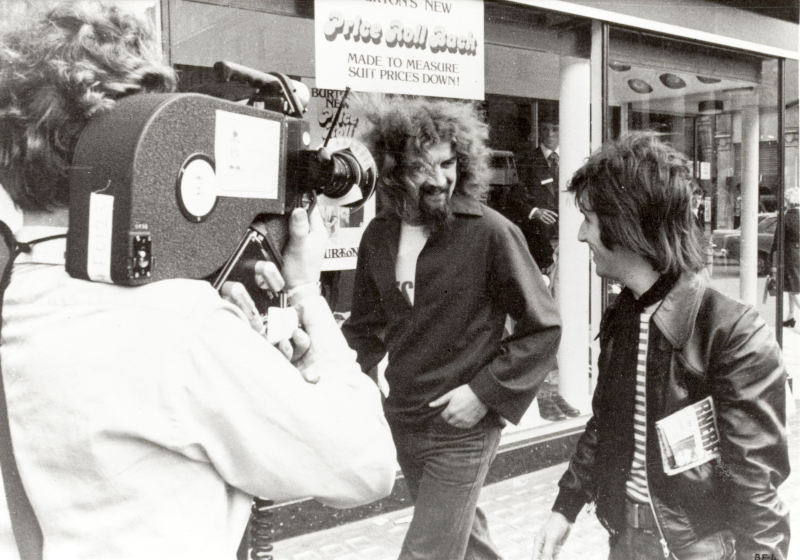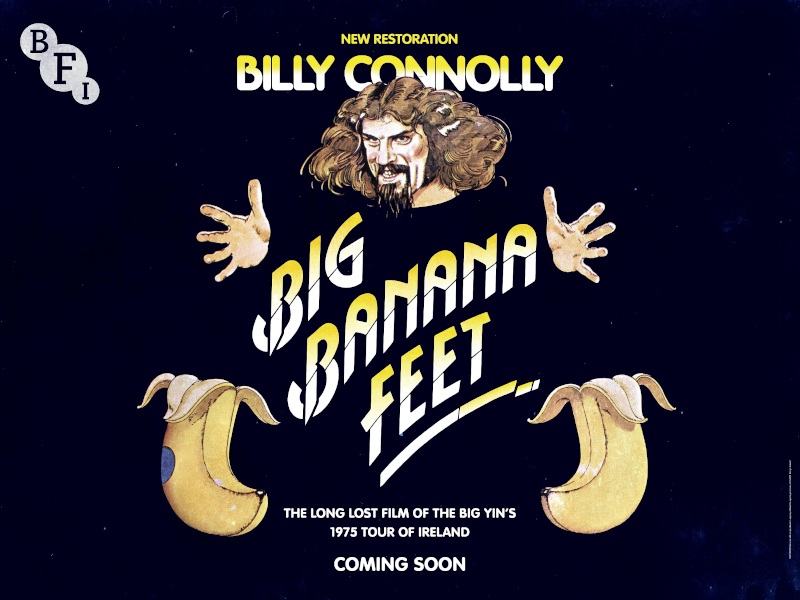Director – Murray Grigor – 1976 – UK – Cert. 12 – 77m
****1/2
The camera follows comedian Billy Connolly to Dublin and Belfast for the final dates of his 1975 tour – 2K restoration is out in UK cinemas on Friday, May 10th, and on BFI Blu-ray/DVD (Dual Format Edition) and digital from Monday, May 20th
This played the Scala Cinema a few times back in the day. I always thought there must be a reason why, and now, with its release in a restored form by the BFI, I get to find out. I must admit to mixed feelings prior to viewing – I’m not someone who particularly enjoys stand-up comedy; indeed, watching videos of comedians doing their material onstage has been known to bore me to tears, even as it enthralls fans.
Although this has clips of Billy Connolly performing on stage – comic routines, songs with banjo and guitar – it’s essentially a fly-on-the-wall piece that captures his personality as he, with the help of his seemingly tireless road manager Billy Johnson, plays dates in Dublin and Belfast on the final leg of his 1975 tour. Watching it, you feel you get to know Connolly well, at least at the period of his career being filmed. More than that: he seems a decent human being and one in whose company you’d be happy to spend time.

The eponymous feet are the stage boots Connolly wore on this tour – modelled on bananas with a blue Fyffes sticker on them, the skins peeling off his legs; he had them commissioned from Glasgow Pop Artist Edmund Smith, and they certainly make an impression. “They’re not identical,” he quips, “but then, bananas never are.”
Scenes of him playing acoustic guitar in his dressing room cut seamlessly into his performance of a song onstage. After hearing the muffled sounds of the band Spuds from his dressing room, we watch him amiably exchange notes on the banjo with them in a lift.
This is the time of the Northern Ireland ‘troubles’, and although that is not the subject of the film, it’s never far away. He chats with Scots soldiers as he comes off the plane at an airport, he passes troops going about their business going down a corridor, and despite the difficult political situation, he makes favourable comments about Ireland: “It’s lovely here,” he says, “you wouldn’t think that a violent place could be so pretty.”

When he receives a rose onstage during a performance, he improvises a gag about it blowing up in his face. It could so easily be offensive, and yet, somehow, it isn’t: instead, it’s highly poignant. The man comes across as experiencing the same stresses and pressures as members of his paying audience, to any of whom such tragedy could occur at any moment. He may be a rising star, but gives the impression that he doesn’t consider himself superior to any of them. Perhaps his ability to express this – which seems to genuinely be a part of his personality – is one of the attributes that made him the star he subsequently became.
We see him interact with the press and media, trying to get them to interview him after seeing his late night stage act rather than before. He has a reputation for his humour being near the knuckle. He openly discusses its “vulgar” qualities with a radio presenter doing an interview, going into material about willies and toilets, and talking about how people need such entertainment as a form of respite from their everyday lives. Elsewhere, we see him on a plane between shows humming the theme from The Dambusters (Michael Anderson, 1955) and mercilessly sending up the English war effort in World War Two.

It’s to the great credit of Connolly and Johnson that they allowed seasoned documentarian Murray Grigor and his cameraman to follow them around for this warts-and-all portrait at the time. The director and crew never impose, merely record what’s happening in front of them. It makes you wonder how much material was recorded altogether, what else was in there, and to what extent the finished film was shaped by the editing process.
However, despite the 77-minute running length, you never feel like you’ve been short-changed; as a portrait of a touring stand-up comedian interacting with those around him on the potentially most difficult leg of a stand-up tour, this delivers everything you could possibly want from it. Seeing the film almost fifty years after the event, it holds up well and, as a bonus, offers a unique outsider’s view of the Northern Ireland troubles in passing.
And at the risk of stating the obvious, some of Connolly’s material filmed onstage – where the camera feels less intimate, although it records everything it needs to – is very, very funny. The film turns out to be a striking piece of documentary work that transcends the obvious appeal of its subject to some considerable degree. No wonder the Scala used to show it.
Big Banana Feet is out in a 2K restoration in cinemas in the UK on Friday, May 10th, and on BFI Blu-ray/DVD (Dual Format Edition) and digital from Monday, May 20th.
Trailer:
